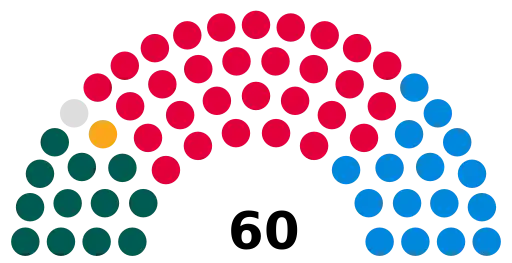| This article is part of a series within the Politics of the United Kingdom on the |
| Politics of Wales |
|---|
 |
|

A member of the Senedd (MS; plural: MSs; Welsh: aelodau o'r Senedd; AS, plural:ASau)[lower-alpha 1] is a representative elected to the Senedd (Welsh Parliament; Welsh: Senedd Cymru). There are sixty members, with forty members chosen to represent individual Senedd constituencies, and twenty to represent the five electoral regions of the Senedd in Wales.
Each person in Wales is represented by five MSs: one for their local constituency (encompassing their local area where they reside), and another four covering their electoral region (a large grouping of constituencies). Wales's five electoral regions are Mid and West Wales, North Wales, South Wales Central, South Wales East and South Wales West.[1]
A holder of this office was formerly known as an assembly member (AM; plural: AMs; Welsh: aelodau'r cynulliad; AC, plural: ACau), under the legislature's former name, the National Assembly for Wales, from its inception in 1999 until 2020 when it adopted its current names, Welsh Parliament, and Senedd Cymru, simply referred to as Senedd in both English and Welsh.[2][3]
Since 2011, members are elected for a five-year term of office under an additional member system, in which 40 MSs represent smaller geographical divisions known as "constituencies" and are elected by first-past-the-post voting, and 20 MSs represent five "electoral regions" using the D'Hondt method of proportional representation. Typically, the largest party holding the largest number of MSs in the Senedd forms the Welsh Government, and in the event of not securing a majority of MSs, the largest party has first rights to begin coalition talks with other smaller parties. Prior to 2011, they held four-year terms, with some MSs calling for a return of four-year terms from the current five.[4] There have been calls to increase the numbers of members of the Senedd to around 90–100, with proposals met with criticism.[5][6]
Methods of election
MSs are elected in one of two ways:[7]
Forty are elected as constituency MSs and twenty are elected as additional members, four from each of five regional groups of constituencies. This additional member system produces a form of proportional representation for each region.
Elections
All MSs positions become simultaneously vacant for elections held on a five-year cycle. If a vacancy arises at another time, due to death or resignation, it may be filled in one of two ways, depending on whether the vacancy is for a first-past-the-post constituency MS or for an additional-member MS.
A constituency vacancy may be filled by a by-election. An additional member vacancy may be filled by the next available candidate on the relevant party list.
See also
- List of members of the Senedd
- List of female members of the Senedd
- List of Plaid Cymru MSs
- Members of the 1st National Assembly for Wales
- Members of the 2nd National Assembly for Wales
- Members of the 3rd National Assembly for Wales
- Members of the 4th National Assembly for Wales
- Members of the 5th National Assembly for Wales
- 2016 National Assembly for Wales election
- 2021 Senedd election
- Senedd constituencies and electoral regions
- Member of Parliament
- Member of the Legislative Assembly (Northern Ireland)
- Member of the Scottish Parliament
Notes
References
- ↑ Explore the Assembly education website Archived 11 January 2013 at the Wayback Machine
- ↑ "Senedd and Elections (Wales) Act 2020". www.legislation.gov.uk. Retrieved 3 May 2020.
- ↑ Commission, Assembly. "Explanatory Notes to Senedd and Elections (Wales) Act 2020". www.legislation.gov.uk. Retrieved 3 May 2020.
- ↑ "Call for Senedd to return to elections every four years as Westminster poised to scrap fixed terms". Nation.Cymru. 6 July 2021. Retrieved 27 July 2021.
- ↑ "Mark Drakeford backs calls for bigger Welsh Parliament". BBC News. 19 May 2021. Retrieved 25 July 2021.
- ↑ "Welsh democracy is under threat, we need more members of the Senedd now more than ever". www.electoral-reform.org.uk. Retrieved 25 July 2021.
- ↑ "Government of Wales Act 2006". www.legislation.gov.uk. Retrieved 9 April 2018.